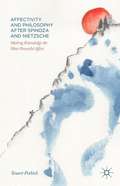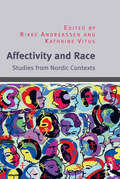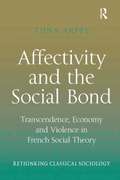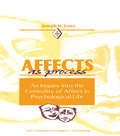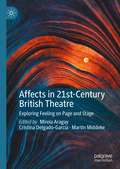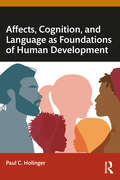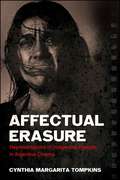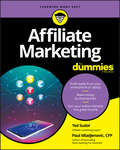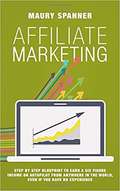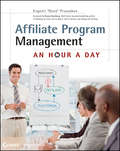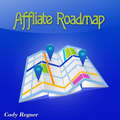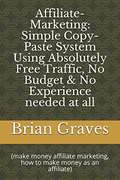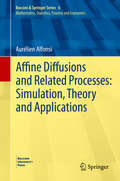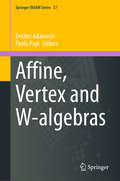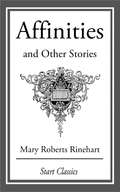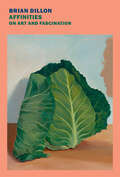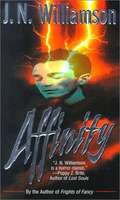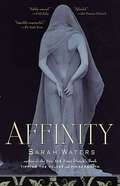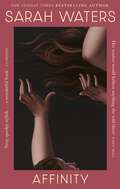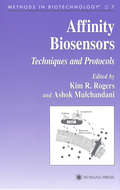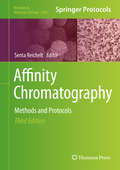- Table View
- List View
Affectivity and Philosophy after Spinoza and Nietzsche: Making Knowledge The Most Powerful Affect
by Stuart PethickPethick investigates a much neglected philosophical connection between two of the most controversial figures in the history of philosophy: Spinoza and Nietzsche. By examining the crucial role that affectivity plays in their philosophies, this book claims that the two philosophers share the common goal of making knowledge the most powerful affect.
Affectivity and Race: Studies from Nordic Contexts
by Rikke Andreassen Kathrine VitusThis book presents new empirical studies of social difference in the Nordic welfare states, in order to advance novel theoretical perspectives on the everyday practices and macro-politics of race and gender in multi-ethnic societies. With attention to the specific political and cultural landscapes of the Nordic countries, Affectivity and Race draws on a variety of sources, including television programmes, news media, fictional literature, interviews, ethnographic observations, teaching curricula and policy documents, to explore the ways in which ideas about affectivity and emotion afford new insights into the experience of racial difference and the unfolding of political discourses on race in various social spheres. Organised around the themes of the politicisation of race through affect, the way that race produces affect and the affective experience of race, this interdisciplinary collection sheds light on the role of feelings in the formation of subjectivities, how race and whiteness are affectively circulated in public life and the ways in which emotions contribute to regimes of inclusion and exclusion. As such it will appeal to scholars across the social sciences, with interests in sociology, anthropology, media, literary and cultural studies, race and ethnicity, and Nordic studies.
Affectivity and the Social Bond: Transcendence, Economy and Violence in French Social Theory (Rethinking Classical Sociology)
by Tiina ArppeAffectivity and the Social Bond offers a fresh and original perspective on the relationship between affectivity and transcendence in nineteenth and twentieth century French social theory. Engaging in a conceptual analysis of the works of Comte, Durkheim, Bataille and Girard, this book exposes a major transformation brought about by the sociological gaze in understandings of affectivity and its relationship to both sociality and transcendence in nineteenth century social thought: the ambivalence between the transcendence of the social and the immanence of affective experience. Revealing the manner in which questions of violence and economy are intertwined in the sociological analysis of affectivity, Affectivity and the Social Bond reflects upon the problem of controlling affectivity, alongside the political implications and possible dangers of a sociological model which seeks the roots of the social bond first and foremost in the affective realm. A rigorous engagement with the classics of French social theory, their treatment of human affectivity and its relationship to social integration and regulation, this book will appeal not only to sociologists and social theorists, but also to those with interests in social and political philosophy and the history of ideas.
Affects As Process: An Inquiry into the Centrality of Affect in Psychological Life (Psychoanalytic Inquiry Book Series #14)
by Joseph M. JonesIn this readable meditation on the nature of emotional experience, Joseph Jones takes the reader on a fascinating walking-tour of current research findings bearing on emotional development. Beginning with a nuanced reappraisal of Freud's philosophical premises, he argues that Freud's reliance on "primary process" as the means of linking body and mind inadvertantly stripped affects of their process role. Further, the resulting emphasis on fantasy left the problem of conceptualizing the mental life of the prerepresentational infant in a theoretical limbo. Affects as Process offers an elegantly simple way out of this impasse. Drawing in the literatures of child development, ethology, and neuroscience, Jones argues that, in their simplest form, affects are best understood as the presymbolic representatives and governors of motivational systems. So conceptualized, affects, and not primary process, constitute the initial processing system of the prerepresentational infant. It then becomes possible to re-vision early development as the sequential maturation of different motivational systems, each governed by a specific presymbolic affect. More complex emotional states, which emerge when the toddler begins to think symbolically, represent the integration of motivational systems and thought as maturation plunges the child into a world of loves and hates that cannot be escaped simply through behavior. Jones' reappraisal of emotional development in early childhood and beyond clarifies the strengths and weaknesses of such traditional concepts as infantile sexuality, object relations, internalization, splitting, and the emergence of the dynamic unconscious. The surprising terminus of his excursion, moreover, is the novel perspective on the self as an emergent phenomenon reflecting the integration of affective and symbolic processing systems.
Affects in 21st-Century British Theatre: Exploring Feeling on Page and Stage
by Martin Middeke Mireia Aragay Cristina Delgado-GarcíaThis book explores the various manifestations of affects in British theatre of the 21st century. The introduction gives a concise survey of existing and emerging theoretical and research trends and argues in favour of a capacious understanding of affects that mediates between more autonomous and more social approaches. The twelve chapters in the collection investigate major works in Britain by playwrights and theatre makers including Mojisola Adebayo, Mike Bartlett, Alice Birch, Caryl Churchill, Tim Crouch and Andy Smith, Rachel De-lahay, Reginald Edmund, James Fritz, David Greig, Idris Goodwin, Zinnie Harris, Kieran Hurley, Lucy Kirkwood, Anders Lustgarten, Yolanda Mercy, Anthony Neilson, Lucy Prebble, Sh!t Theatre, Penelope Skinner, Stef Smith, Kae Tempest and debbie tucker green. The interpretations identify significant areas of tension as they relate affects to the fields of cognition, politics and hope. In this, the chapters uncover interrelations of thought, intention and empathy; they reveal the nexus between identities, institutions and ideology; and, finally, they explore how theatre can accomplish the transition from a sense of crisis to utopian visions.
Affects, Cognition, and Language as Foundations of Human Development
by Paul C. HolingerAffects, Cognition, and Language as Foundations of Human Development considers human development from the three most basic systems—affects (our earliest feelings), cognition, and language. Holinger explores how these systems enhance potential and help prevent problems, both in individuals and in societies.He begins with a focus on the affects of interest and anger and how affects provide the foundation for the sense of self and playing and creating. The author delves into cognition in the context of human relationships and infants’ remarkable capacity to understand language long before they can talk. Drawing on the work of Darwin, Freud, Stern, Basch, and the ground-breaking ideas of Silvan Tomkins, this work thus deepens the exploration into human development by integrating affects, cognition, and language. The author also uses this triad to examine two important societal issues: physical punishment, and bias, prejudice, and violence.This book will not only appeal to psychologists, psychoanalysts, psychiatrists, and social workers but is also accessible to parents, educators, and policymakers.
Affectual Erasure: Representations of Indigenous Peoples in Argentine Cinema (SUNY series in Latin American Cinema)
by Cynthia Margarita TompkinsAffectual Erasure examines how Argentine cinema has represented Indigenous peoples throughout a period spanning roughly a century. Cynthia Margarita Tompkins interrelates her discussion of films with the ethnographic context of the Indigenous peoples represented and an analysis of the affective dimensions at play. These emotions underscore the inherent violence of generic conventions, as well as the continued political violence preventing Indigenous peoples from access to their ancestral lands and cultural mores. Tompkins explores a broad range of movies beginning in the silent period and includes both feature films and documentaries, underscored by archival and contemporary film stills. She traces the initial erotic projection, moving through melodrama to the conventions of the Western, into the 1960s focus on decolonization, superseded by allegorical renditions and the promise of self-expression in late twentieth-century documentaries. Each section includes an introduction to the sociohistorical events of the period and their impact on film production. Analyzed chronologically, the films evidence different stages in the projection of the hegemonic Argentine imaginary, which fails to envision the daily life of Indigenous peoples prior to conquest or in colonial times—and remains in denial of their existence in the present.
Affenpinscher
by Carol Ann Johnson Jerome CushmanProtecting his master from intruders, whether rodent or human, was priority number one for this monkey-faced urchin developed in southern Germany during the 19th century. Classified as a "Toy Dog" throughout the world, the Affenpinscher is indeed part terrier and part watchdog, even though his role as a house pet has been his main stead in life for generations. Blessed with independence of mind and a most amusing take on the world around him, the Affenpinscher proves to be a perfect choice for the owner who is seeking a bright, intuitive and comic companion animal. Written by top Affenpinscher breeder and handler Jerome Cushman of the famous Hilane kennels in New York, this Special Limited Edition covers the history of the breed in Europe and details the development of the breed in the US. This book also discusses the breed's characteristics and the requirements of the right owner for an Affenpinscher. The author shares his insight into the breed standard as well as the proper selection of a breeder and puppy. New owners will welcome the chapters on house-training and obedience commands, plus the sections on grooming, feeding, home safety and much more. A special chapter on preventive healthcare, written by renowned veterinarian Dr. Lowell Ackerman, provides up-to-date, accurate information on inoculations, parasites, spaying/neutering and more.
Affiliate Marketing For Dummies
by Paul Mladjenovic Ted SudolGet Your Piece of the Hottest Business Online Today! Affiliate marketing is your route to earning some serious bucks. Thousands of companies both large & small like Amazon, Sears, Best Buy, Overstock, Lowe’s, Priceline & others have programs so you can profit from the thousands of products they offer. Affiliate marketing is ideal for bloggers looking to monetize their work. This is a multibillion-dollar market, and there are 10+ million people involved in the biz worldwide. There’s always room for more because the opportunity keeps growing as more and more companies offer affiliate programs. Affiliate Marketing For Dummies shows you how to get a slice of the pie! Choose the right affiliate product or service for you Find the best affiliate programs for you Find the best affiliate marketing strategies Affiliate Marketing for Dummies is your friendly step-by-step guide to getting in on this moneymaker—big time.
Affiliate Marketing: Learn How To Make $10,000+ Each Month On Autopilot
by Michael EzeanakaThis book will teach you everything you need to know about affiliate marketing. It discusses how it all started and evolved to the multi-billion dollar industry that it is today. <p><p> In this book, we will discuss how you can get your slice of the affiliate marketing pie. You will learn how you can start with this business and build your affiliate marketing assets from scratch. You will also learn how to develop content and drive massive amounts of traffic to them through organic (free) and paid methods. <p> Lastly, we talk in depth about the different strategies on how you can become successful as an Internet marketer. With the help of this book, you will be on your way to earn a six-figure monthly income. <p> Start building your affiliate marketing empire today!
Affiliate Marketing: Step by Step Blueprint to Earn a Six Figure Income on Autopilot from Anywhere in the World, Even if You Have No Experience
by Maury Spanner<p>Offering products and services people actually want to buy and earning hefty affiliate commissions is a great way to start a real online business with little risk or investment - but only if you know how to do it right! Need to learn how to run a successful affiliate marketing campaign the right way? <p>With this guide you will be armed with the fundamental knowledge you need to succeed in the exciting world of affiliate marketing. You’ll also learn how to avoid making mistakes that could cost you a lot of money and waste your valuable time! <p>Even if you have no background in affiliate marketing or online business, have no fear! With this guide in your hands that will not be a barrier for you any longer. Learn how to successfully market products and services that people love while earning juicy affiliate commissions for yourself when you grab this guide now!</p>
Affiliate Program Management
by Evgenii PrussakovAffiliate marketing is hot; here's how to get your program goingNearly every retailer in the Internet Retailers' Top 500 has an affiliate marketing program. Now free affiliate networks, automation software, and pay-for-performance compensation models are making it easy for small businesses to take advantage of this marketing tool. In the popular An Hour a Day format, this guide features a detailed, real-world, task-based approach to developing, launching, and managing a successful affiliate marketing program. It explores market research, determining payment models and reporting guidelines, recruiting affiliates, crafting appropriate communications, and much more.Affiliate marketing programs help boost marketing efforts without incurring excessive costs; this Hour a Day guide provides everything merchants, business owners, and those charged with managing an affiliate program need to knowOffers a modern, real-world, step-by-step guide to researching, launching, managing, and optimizing a successful affiliate marketing programCovers social media; creating policies; working with feeds, coupons, widgets, and video; creating compelling content; handling partners who are not meeting goals; and much moreAffiliate Program Management: An Hour a Day is the do-it-yourself guide to planning and maintaining a successful affiliate program.
Affiliate Roadmap: Jubiläumsedition Zum 102. Todesjahr Von Karl May (Correct Times)
by Cody Regner"To succeed at internet marketing you need a growing network of websites. These sites will feed each other traffic, pre-sell affiliate programs, generate adsense revenue, and grow your opt-in email lists."There are several ways for you to do this, but they all require a basic skill set. I'm assuming you know the basics of hosting, getting a website, and creating one. If you have no idea how to do any of this, it isn't that hard.I will be showing you some tools later on that let you create websites and actually "SEE" what you are doing as you do it. So don't worry, if you are not quite sure how to put up your own website, get a hosting account and all: it is really quite easy, and you will learn about it in this guide...
Affiliate-Marketing: Simple Copy-paste System Using Absolutely Free Traffic, No Budget And No Experience Needed At All
by Brian GravesAnyone Can Do It! The Only Way to Fail is If YOU Don't Try! This is the easiest affiliate marketing system any newbie or serious online marketer could hope for! I found this particular company that pays big affiliate commissions in the dog niche. BUT what's even better, is that they do the follow-ups for you! Meaning, you don't have to mess with autoresponders, and you don't have to write any emails. Because, they do it for you. Every email they send contains your affiliate link... ...plus they send helpful daily dog training tips (...I know coz I subscribed to them)... ...and they offer different HOT products, and even monthly membership to their paid newsletter. It's really amazing because all you have to do is create a 10 sec UGLY video, with a single background photo, add background music YouTube provides for free .and insert your affiliate link in the video. That's it - I did not talk or show my face. And within that month, I got a commission from them. I continued making a few more videos (...coz they were so easy to do)... And in 2-3 months the commissions were coming in regularly. It really is as simple as that. I am going to take you through the entire process, step by step and then show you how to scale it up for even more profit. You don't want to miss out on this. Hit the buy button and get in now.
Affine Diffusions and Related Processes: Simulation, Theory and Applications (Bocconi & Springer Series #6)
by Aurélien AlfonsiThis book gives an overview of affine diffusions, from Ornstein-Uhlenbeck processes to Wishart processes and it considers some related diffusions such as Wright-Fisher processes. It focuses on different simulation schemes for these processes, especially second-order schemes for the weak error. It also presents some models, mostly in the field of finance, where these methods are relevant and provides some numerical experiments. The book explains the mathematical background to understand affine diffusions and analyze the accuracy of the schemes.
Affine Maps, Euclidean Motions and Quadrics (Springer Undergraduate Mathematics Series)
by Agustí Reventós TarridaAffine geometry and quadrics are fascinating subjects alone, but they are also important applications of linear algebra. They give a first glimpse into the world of algebraic geometry yet they are equally relevant to a wide range of disciplines such as engineering. This text discusses and classifies affinities and Euclidean motions culminating in classification results for quadrics. A high level of detail and generality is a key feature unmatched by other books available. Such intricacy makes this a particularly accessible teaching resource as it requires no extra time in deconstructing the author's reasoning. The provision of a large number of exercises with hints will help students to develop their problem solving skills and will also be a useful resource for lecturers when setting work for independent study. Affinities, Euclidean Motions and Quadrics takes rudimentary, and often taken-for-granted, knowledge and presents it in a new, comprehensive form. Standard and non-standard examples are demonstrated throughout and an appendix provides the reader with a summary of advanced linear algebra facts for quick reference to the text. All factors combined, this is a self-contained book ideal for self-study that is not only foundational but unique in its approach.' This text will be of use to lecturers in linear algebra and its applications to geometry as well as advanced undergraduate and beginning graduate students.
Affine, Vertex and W-algebras (Springer INdAM Series #37)
by Paolo Papi Dražen AdamovićThis book focuses on recent developments in the theory of vertex algebras, with particular emphasis on affine vertex algebras, affine W-algebras, and W-algebras appearing in physical theories such as logarithmic conformal field theory. It is widely accepted in the mathematical community that the best way to study the representation theory of affine Kac–Moody algebras is by investigating the representation theory of the associated affine vertex and W-algebras. In this volume, this general idea can be seen at work from several points of view. Most relevant state of the art topics are covered, including fusion, relationships with finite dimensional Lie theory, permutation orbifolds, higher Zhu algebras, connections with combinatorics, and mathematical physics. The volume is based on the INdAM Workshop Affine, Vertex and W-algebras, held in Rome from 11 to 15 December 2017. It will be of interest to all researchers in the field.
Affinities and Other Stories: and Other Stories
by Mary Roberts RinehartFive short stories dealing with the escapades of society women in America and England. CONTENTS: I AFFINITIES II THE FAMILY FRIEND III CLARA'S LITTLE ESCAPADE IV THE BORROWED HOUSE V SAUCE FOR THE GANDER
Affinities: On Art and Fascination
by Brian DillonA meditation on the power and pleasures of the image, from paintings to photographs to migraine auras, by one of Britain's finest literary minds.In Affinities, Brian Dillon, who Joyce Carol Oates has said writes &“fascinating prose . . . on virtually any subject,&” explores images and artists he is drawn to and analyzes the attraction. What does it mean to claim affinity with a picture? What do feelings of affinity imply about the experience of art and of the world? Affinities is a critical and personal study of a sensation that is not exactly taste, desire, or solidarity, but has aspects of all three. Approaching this subject via discrete examples, Dillon examines works by artists such as Dora Maar and Andy Warhol, Rinko Kawauchi and Susan Hiller, as well as scientific or vernacular images of sea creatures and migraine auras. Written as a series of linked essays, Affinities completes a trilogy, with Essayism and Suppose a Sentence, about the intimate and abstract pleasures of reading and looking.
Affinity
by J. N. Williamson J. WilliamsonIndiana college student Quent Wilcox has had some disturbing nightmares, though he can't quite remember them when he wakes up. He's been stumbling across huge gaps in his memory, like what happened to his parents, and did he ever have a girlfriend? Not only is Quent losing his memory, but he gaining someone else's. Quent finds with his new memories come strange, unearthly powers--and grave danger.
Affinity
by Sarah WatersAn upper-class woman recovering from a suicide attempt, Margaret Prior has begun visiting the women's ward of Millbank prison, Victorian London's grimmest jail, as part of her rehabilitative charity work. Amongst Millbank's murderers and common thieves, Margaret finds herself increasingly fascinated by on apparently innocent inmate, the enigmatic spiritualist Selina Dawes. <P><P> Selina was imprisoned after a séance she was conducting went horribly awry, leaving an elderly matron dead and a young woman deeply disturbed. Although initially skeptical of Selina's gifts, Margaret is soon drawn into a twilight world of ghosts and shadows, unruly spirits and unseemly passions, until she is at last driven to concoct a desperate plot to secure Selina's freedom, and her own.
Affinity
by Sarah Waters'Affinity is the work of an intense and atmospheric imagination . . . Sarah Waters is such an interesting writer, a kind of feminist Dickens' Fiona Pitt-Kethley, Daily TelegraphSet in and around the women's prison at Milbank in the 1870s, Affinity is an eerie and utterly compelling ghost story, a complex and intriguing literary mystery and a poignant love story with an unexpected twist in the tale. Following the death of her father, Margaret Prior has decided to pursue some 'good work' with the lady criminals of one of London's most notorious gaols. Surrounded by prisoners, murderers and common thieves, Margaret feels herself drawn to one of the prisons more unlikely inmates - the imprisoned spiritualist - Selina Dawes. Sympathetic to the plight of this innocent-seeming girl, Margaret sees herself dispensing guidance and perhaps friendship on her visits, little expecting to find herself dabbling in a twilight world of seances, shadows, unruly spirits and unseemly passions.
Affinity
by Sarah WatersSet in and around the women's prison at Milbank in the 1870's , AFFINITY is an eerie and utterly compelling ghost story, a complex and intriguing literary mystery and a poignant love story with an unexpected twist in the tale. Following the death of her father, Margaret Prior has decided to pursue some 'good work' with the lady criminals of one of London's most notorious gaols. Surrounded by prisoners, murderers and common thieves, Margaret feels herself drawn to one of the prisons more unlikely inmates - the imprisoned spiritualist - Selina Dawes. Sympathetic to the plight of this innocent-seeming girl, Margaret sees herself dispensing guidance and perhaps friendship on her visits, little expecting to find herself dabbling in a twilight world of seances, shadows, unruly spirits and unseemly passions.
Affinity Biosensors: Techniques and Protocols (Methods in Biotechnology #7)
by Kim Rogers Ashok MulchandaniA cutting-edge collection of detailed, step-by-step techniques and protocols for constructing, evaluating, and using affinity-based biosensors. Ideal for novices starting research in their field or experienced researchers wanting to use a biosensor for a specific analytical measurement, the methods detailed here allow biochemists, analytical chemists, microbiologists, and engineers to successfully apply biosensor technology to their specific problems. The techniques include the use of antibodies and membrane receptors to construct optical, thermal, acoustic, and electrochemically based biosensors. Additional techniques involve antibodies, receptors, nucleic acids, liposomes, and eukaryotic cells. A companion volume, Enzyme and Microbial Biosensors: Protocols and Techniques, by Mulchandani & Rogers, concentrates on enzyme-biosensors.
Affinity Chromatography: Methods and Protocols (Methods in Molecular Biology #1286)
by Senta ReicheltThe aim of this edition is to introduce the beginner to the basics of affinity chromatography and provide practical knowledge for the development of affinity separation protocols. Affinity Chromatography: Methods and Protocols, Third Edition guides readers through new state of the art protocols, molecular modelling, and the study of ligand-target interactions. Written in the successful Methods in Molecular Biology series format, chapters include introductions to their respective topics, lists of the necessary materials and reagents, step-by-step, readily reproducible protocols, and notes on troubleshooting and avoiding known pitfalls. Authoritative and easily accessible, Affinity Chromatography: Methods and Protocols, Third Edition is designed as a useful resource for those interested in the rapid and quantitative isolation of biomolecules with high purity.
